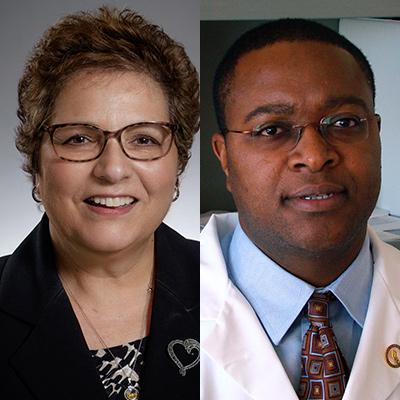
Electra D. Paskett, PhD, is the Marion N. Rowley Professor of Cancer Research at The Ohio State University (OSU). She is the director of the Division of Cancer Prevention and Control in the College of Medicine, a professor in the Division of Epidemiology in the College of Public Health, and the associate director for Population Sciences and Program Leader of the Cancer Control Program in the Comprehensive Cancer Center of OSU. She is the director of the Center for Cancer Health Equity at the James Cancer Hospital. Colin D. Weekes, MD, PhD, is director of Medical Oncology Research for Pancreatic Cancer at Massachusetts General Hospital. He is the 2018-2019 chair of the ASCO Annual Meeting Education Committee and is a graduate of the ASCO Leadership Development Program.
“Caring for every patient. Learning from every patient.” For ASCO President Dr. Monica Bertagnolli, this is more than just a presidential theme. To put action to words, she is heading to local communities to moderate question-and-answer town hall sessions with patients, caregivers, and oncology professionals. She and other ASCO members are responding to patients’ concerns and, at the same time, they are learning more about the challenges that exist in getting quality cancer care. These sessions are called “ASCO in the Community: Listening and Learning from Our Patients.” This post details the lessons learned from the first session, which took place in Marietta, Ohio, in August 2018 and was hosted by ASCO member Dr. Electra D. Paskett.
What was your role in the town hall?
Electra Paskett (EP): I helped arrange the town hall at the Strecker Cancer Center, and we were pleased to welcome more than 100 patients and oncology professionals who shared stories and talked about the needs of patients in Appalachia. I have conducted research and worked with the members of this Appalachian community since 2003.
Colin Weekes (CW): I was on the panel of speakers at the town hall, along with Dr. Bertagnolli. I was present as a representative of ASCO and a guest of Dr. Paskett and the local center.
What is the cancer experience like in rural Ohio, where the town hall took place?
EP: The Appalachian area is a federal-designated area with areas of high poverty and low resources, including health care. There are many challenges for the people needing cancer care here, including not having reliable transportation, having to travel long distances for care, less access to high-speed internet, fewer medical specialties available locally, and often there aren’t enough charitable resources to be able to help all who need it. Compared to the overall U.S. population, the people in this region are mainly white and tend to have higher rates of poverty, less education, higher rates of smoking, and more obesity. They have higher rates of cancer and are more likely to die from the disease.
CW: This is a rural part of the United States. There are limited opportunities for jobs and education. Resources for health care and daily life are very limited, making it very hard to get appropriate cancer care. This ranges all the way from cancer screening to cancer treatment and survivorship. The people of this area are very proud and self-motivated, with a strong sense of “family”—meaning their nuclear family as well as the larger community as a whole. But this is a double-edged sword, because it can mean there is a reluctance to trust and seek the help of people from outside their community. I think the cancer care team and patients should seek to build trust and two-way communications with each other, so that the best cancer care can be delivered.
Based on the discussions at the town hall, what information do you think patients need to know?
EP: Patients experience a broad mix of barriers to care, including financial challenges, transportation difficulties, access to treatment information, and more, and we heard many moving examples of those during the town hall. I would encourage patients to ask about access to patient navigators and other resources at the place they are receiving treatment, so they can address individual challenges as they follow their cancer treatment plans.
CW: Communication is key. This means communication in all of its forms, between doctor and patient, between caregiver and patient, between the health institution and the community.
In particular, patients want to be given the tools from health care providers to help them help themselves. One size does not fit all when it comes to cancer prevention, treatment, and after treatment. As providers, we must customize our approaches for the specific patients we are treating, and all of this depends on effective, mutual, and respectful communication. The health care provider must be able to effectively communicate with the patient in order for the patient to be empowered to obtain the best possible health care within the circumstances of their lives. The patient may have limited resources and has to allocate those as best they can to meet all of the demands of life. This communication also provides a comfort level for the patient to share their life experiences with the health care providers, which in turn allows the health care provider to begin to understand what the patient’s life is like outside of the clinic.
In 2018 to 2019, ASCO is holding a series of ASCO Presidential Town Halls with local groups across the United States to hear from patients, providers, and the general public about real-world barriers to quality cancer care and to talk about ways to provide the best care to every person diagnosed with cancer. These events are free and open to everyone; pre-registration is necessary. Check back on Cancer.Net for additional locations and dates to be announced soon.
Whether you will be able to attend an ASCO Presidential Town Hall near you or not, we welcome comments from patients and caregivers about your experiences with cancer.
